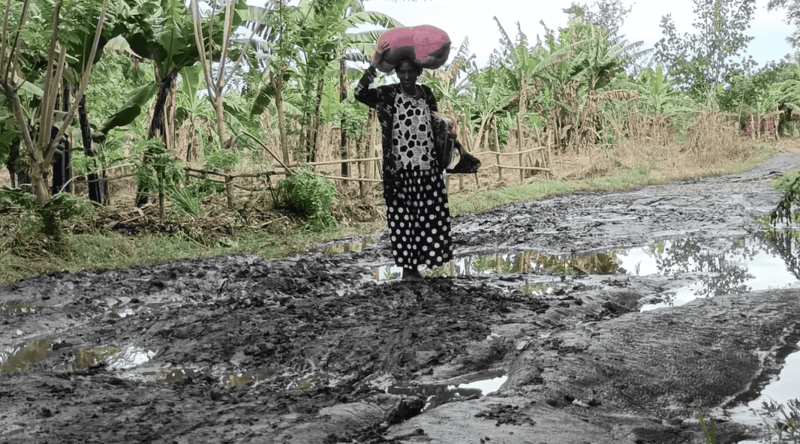Kasese, Uganda – In a tragic turn of events, torrential rains have unleashed devastating floods along River Mubuku in Karusandara Sub-County, leaving over 65 families homeless and destroying vital crops that thousands depend on for survival. This latest climate-induced disaster has exposed the vulnerability of communities in Uganda’s flood-prone regions and highlighted the urgent need for action as extreme weather patterns intensify.
For Morian Mbambu, a 20-year-old mother of two, life changed in an instant. Her modest home was swept away by the raging waters of River Mubuku, forcing her to seek refuge with her brother-in-law. Now, 26 people are crammed into a tiny four-room house, struggling to cope with the lack of space and privacy.
The suddenness of the disaster caught many residents off guard. Timothy Okello recounted how what began as a light drizzle quickly escalated into a catastrophic flood. “By 8 PM, the river had swallowed our entire village,” he said, describing scenes of chaos and despair as families scrambled to salvage whatever they could from the rising waters.

Beyond the immediate human impact, the floods have dealt a severe blow to local livelihoods. Fields of maize, beans, bananas, cassava, and soy—critical staples for 247 families—were completely wiped out. With these crops gone, food insecurity looms large, threatening not only the displaced but also surrounding communities dependent on agricultural trade.
Compounding the crisis is the destruction of homes. Cracked walls and mud-filled compounds create breeding grounds for diseases like cholera and malaria. Residents fear outbreaks amid already dire living conditions.
Meanwhile, environmental degradation continues to exacerbate the problem. Siltation along River Mubuku is obstructing its natural flow, increasing the likelihood of future flooding. Local leaders warn that without intervention, similar disasters will become more frequent and severe.
Despite the scale of the devastation, government assistance has been minimal. Eriphazi Muhindi, Chairperson of the Kasese District Local Council V (LCV), acknowledged the financial constraints facing authorities. “We lack funds to tackle climate disasters,” she admitted, underscoring the systemic challenges in responding effectively to such emergencies.
Community leaders, however, are growing increasingly frustrated. The Kabuga LC1 Chairperson has issued a desperate plea for urgent desiltation of River Mubuku to mitigate further risks. Without significant investment in infrastructure and disaster preparedness, experts warn that Kasese—a known flood hotspot—will remain perilously vulnerable.
This marks the third major flood incident in Kasese this year alone, underscoring the growing toll of climate change on Uganda’s most marginalized populations.
To date, there has been no substantial national relief effort directed toward the affected families. Instead, strained community networks are bearing the brunt of support, stretching already limited resources thin.
The situation in Kasese serves as a stark reminder of the broader challenges posed by climate change across Africa. Poor drainage systems, rampant deforestation, and inadequate urban planning continue to amplify the effects of extreme weather, disproportionately impacting rural communities least equipped to handle them.
As the displaced families of Karusandara Sub-County grapple with loss and uncertainty, their plight underscores an urgent call for both immediate humanitarian aid and long-term strategies to combat the escalating climate crisis.
For now, hope rests on collective resilience—and the possibility that their cries for help will finally be heard.












